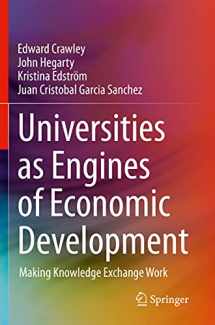
Universities as Engines of Economic Development: Making Knowledge Exchange Work
Book details
Summary
Description
This book describes patterns of behavior that collectively allow universities to exchange knowledge more effectively with industry, accelerate innovation and eventually contribute to economic development. These are based on the effective practices of leading and ambitious universities around the world that the authors have benchmarked, and the personal experiences of the authors in a number of international institution building projects, including those of MIT.The authors provide guidance that is globally applicable, but must be locally adapted. The approach is first to describe the context in which universities act as engines of economic development, and then present a set of effective practices in four domains: education, research, innovation, and supporting practices. Each of these domains has three to six practices, and each practice is presented in a similar template, with an abstract, a rationale and description, key actions and one or two mini-case studies. The practices are summarized by integrative case studies.
The book:
Focuses on a globally adaptable set of effective practices, complemented by case studies, that can enhance universities’ contribution to economic development, based on an integrated view of education, research and innovation; Presents effective practices and broader insights that come from real global experience, spelled out in templates and explained by cases; Includes tangible resources for university leaders, policy makers and funders on how to proceed.
From the Back Cover
This book describes patterns of behavior, which collectively allow universities to exchange knowledge more effectively with industry, accelerate innovation and eventually contribute to economic growth and development. These are based on the effective practices of MIT and other universities the authors have benchmarked, building on the practices that MIT has exported in its international institution building projects conducted since 2000. The authors provide guidance that is globally applicable, but must be locally adapted. The approach is first to describe the context in which universities act as engines of economic development, and then present a set of effective practices in four domains: education, research, innovation, and supporting practices. Each of these domains has six to nine practices, and each practice is presented in a similar template, with an abstract, a rationale and description, and one or two mini-case studies. Each domain is summarized by an integrative case study.
Focuses on a globally adaptable set of effective practices, complemented by case studies, that can enhance universities’ contribution to economic development, based on an integrated view of education, research and innovation; Presents effective practices and broader insights that come from real global experience, spelled out in templates and explained by cases; Includes tangible resources for university leaders, policy makers and funders on how to proceed.


We would LOVE it if you could help us and other readers by reviewing the book
Book review



